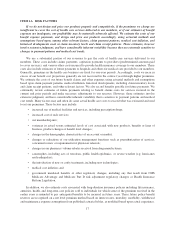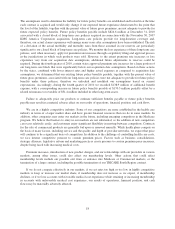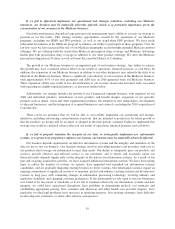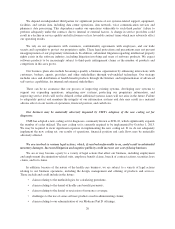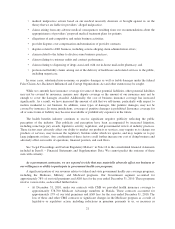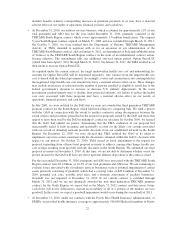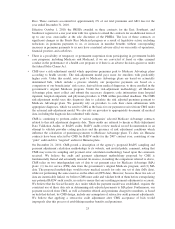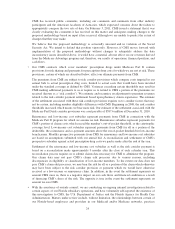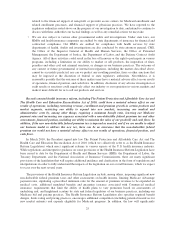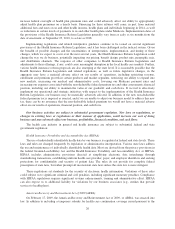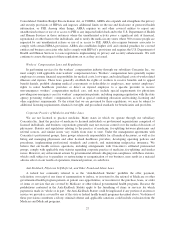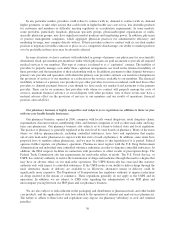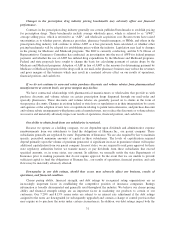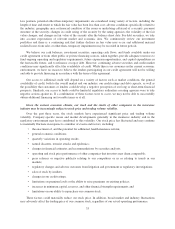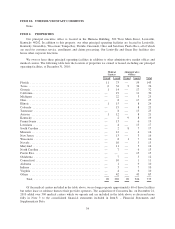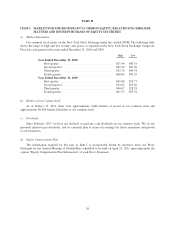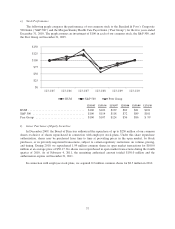Humana 2010 Annual Report Download - page 37
Download and view the complete annual report
Please find page 37 of the 2010 Humana annual report below. You can navigate through the pages in the report by either clicking on the pages listed below, or by using the keyword search tool below to find specific information within the annual report.Consolidated Omnibus Budget Reconciliation Act, or COBRA, ARRA also expands and strengthens the privacy
and security provisions of HIPAA and imposes additional limits on the use and disclosure of protected health
information, or PHI. Among other things, ARRA requires us and other covered entities to report any
unauthorized release or use of or access to PHI to any impacted individuals and to the U.S. Department of Health
and Human Services in those instances where the unauthorized activity poses a significant risk of financial,
reputational or other harm to the individuals, and to notify the media in any states where 500 or more people are
impacted by any unauthorized release or use of or access to PHI. ARRA also requires business associates to
comply with certain HIPAA provisions. ARRA also establishes higher civil and criminal penalties for covered
entities and business associates who fail to comply with HIPAA’s provisions and requires the U.S. Department of
Health and Human Services to issue regulations implementing its privacy and security enhancements. We will
continue to assess the impact of these regulations on us as they are issued.
Workers’ Compensation Laws and Regulations
In performing services for the workers’ compensation industry through our subsidiary Concentra Inc., we
must comply with applicable state workers’ compensation laws. Workers’ compensation laws generally require
employers to assume financial responsibility for medical costs, lost wages, and related legal costs of work-related
illnesses and injuries. These laws generally establish the rights of workers to receive benefits and to appeal
benefit denials, prohibit charging medical co-payments or deductibles to employees, may restrict employers’
rights to select healthcare providers or direct an injured employee to a specific provider to receive
non-emergency workers’ compensation medical care, and may include special requirements for physicians
providing non-emergency care for workers’ compensation patients, including requiring registration with the state
agency governing workers’ compensation, as well as special continuing education and training, licensing and
other regulatory requirements. To the extent that we are governed by these regulations, we may be subject to
additional licensing requirements, financial oversight, and procedural standards for beneficiaries and providers.
Corporate Practice of Medicine and Other Laws
We are not licensed to practice medicine. Many states in which we operate through our subsidiary
Concentra Inc. limit the practice of medicine to licensed individuals or professional organizations comprised of
licensed individuals, and business corporations generally may not exercise control over the medical decisions of
physicians. Statutes and regulations relating to the practice of medicine, fee-splitting between physicians and
referral sources, and similar issues vary widely from state to state. Under the management agreements with
Concentra’s professional groups, these groups retain sole responsibility for all medical decisions, as well as for
hiring and managing physicians and other licensed healthcare providers, developing operating policies and
procedures, implementing professional standards and controls, and maintaining malpractice insurance. We
believe that our health services operations, including arrangements with Concentra’s affiliated professional
groups, comply with applicable state statutes regarding corporate practice of medicine, fee-splitting, and similar
issues. However, any enforcement actions by governmental officials alleging non-compliance with these statutes,
which could subject us to penalties or restructuring or reorganization of our business, may result in a material
adverse effect on our results of operations, financial position, or cash flows.
Anti-Kickback, Physician Self-Referral, and Other Fraud and Abuse Laws
A federal law commonly referred to as the “Anti-Kickback Statute” prohibits the offer, payment,
solicitation, or receipt of any form of remuneration to induce, or in return for, the referral of Medicare or other
governmental health program patients or patient care opportunities, or in return for the purchase, lease, or order
of items or services that are covered by Medicare or other federal governmental health programs. Because the
prohibitions contained in the Anti-Kickback Statute apply to the furnishing of items or services for which
payment is made in “whole or in part,” the Anti-Kickback Statute could be implicated if any portion of an item or
service we provide is covered by any of the state or federal health benefit programs described above. Violation of
these provisions constitutes a felony criminal offense and applicable sanctions could include exclusion from the
Medicare and Medicaid programs.
27


